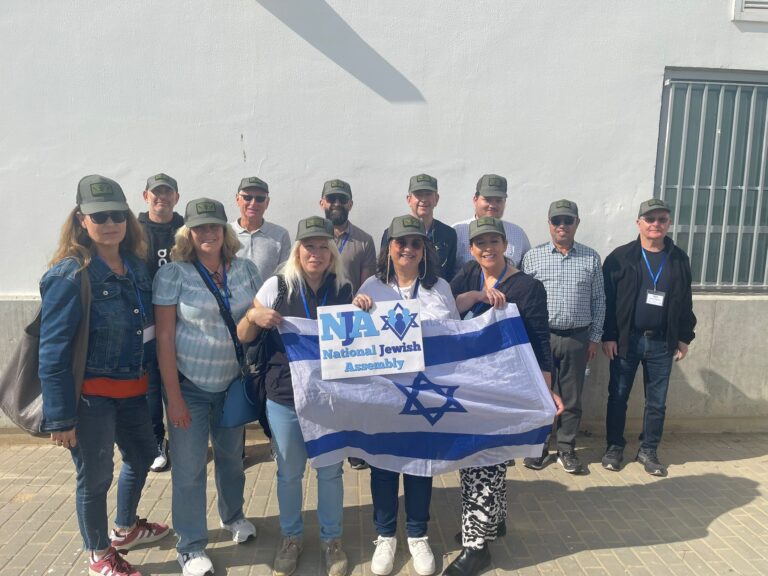On the second day of the National Jewish Assembly (NJA) Solidarity Mission to Israel, the delegation travelled south to witness firsthand the resilience of Israel’s frontline communities, including elite IDF units and southern towns devastated by the October 7 attacks.
The delegation was hosted at the IDF Yahalom Unit, an elite combat engineering force specialising in neutralising Hamas’ terror tunnel network. Welcomed by Arnon Shiboleth, Chairman of the Yahalom Foundation, the delegation learned how Yahalom soldiers carry out high-risk sabotage missions, destroy enemy explosives, and handle the most advanced military robotics in underground warfare.
The Yahalom Foundation provides critical support to the unit’s soldiers and their families, especially for those suffering from PTSD or injuries sustained in battle. Unlike many charities, 100% of its donations go directly to supporting soldiers, ensuring that no combat veteran is left behind.
The delegation then entered a training tunnel that simulates the conditions IDF soldiers face in Gaza. To experience the sheer terror endured by Israeli hostages, the group was asked to turn off their phone lights – immersed in complete darkness, evoking the unimaginable eight-month ordeal suffered by kidnapped Israelis.
Before the recent ceasefire, 27 hostages were found in Hamas tunnels by Yahalom; only one was found alive. This grim reality underscores the crucial role of the IDF in dismantling Hamas’ underground terror network.
The NJA delegation then visited Zikim Beach, a once-thriving coastal area that was infiltrated by Hamas terrorists who landed from the sea on October 7. They met Itamar Revivo, Mayor of Hof Ashkelon, a hero of that day’s defence.
Mayor Revivo outlined his vision to restore Zikim Beach, once ranked among Israel’s top three beaches, into a place of healing and resilience. A new national surfing centre is being built, inspired by displaced children who found solace in surfing during their months away from home.
The mayor also highlighted a shocking reality: Gaza’s sewage crisis is largely due to Hamas dismantling sewage pipes to build rocket launchers. This criminal negligence not only poisons Gaza’s own water supply but has repeatedly forced Zikim Beach to shut down.
At Netiv Ha’Asara, a moshav right on the Gaza border, the delegation stood beneath Israel’s tallest flag, a defiant symbol proclaiming: “We are here, and we will remain.”
Residents of this community, who long believed in peaceful coexistence, are grappling with betrayal. Twenty civilians were slaughtered on October 7 after Hamas and thousands of Gazans breached the border.
During the visit, the delegation heard machine gunfire from the Gazan side – a stark reminder of the constant threats still facing southern Israel.
The final stop was Kibbutz Nirim, where the NJA delegation met Adele Raemer, a survivor of October 7 and a steadfast advocate for rebuilding her community. Adele Raemer embodies the spirit of Israeli resilience. A long-time resident of Kibbutz Nirim, she endured the horrors of October 7th, losing more than 50 people from her close-knit community. Listening to her recount the events of that day was both heartbreaking and inspiring – her strength, optimism, and unwavering determination in the face of unimaginable loss left a profound impact on us all.
The NJA delegation had the privilege of hearing Adele share her story on her kibbutz, standing with her as a mezuzah was placed on her safe room door. This was part of a broader initiative to restore mezuzot to homes in devastated communities – an act of faith and renewal. As the mezuzah was affixed, the room filled with heartfelt cries of “Mazel Tov,” a phrase that had been absent from these walls for too long. Adele beamed, proudly flashing the now-iconic Emily Damari hand sign, as our entire group joined together in a spontaneous and emotional rendition of Am Yisrael Chai.
Kibbutz Nirim, which celebrated its seventy-seventh anniversary on October 6, was transformed overnight into a scene of unimaginable horror. Adele spoke of friends and neighbours murdered or kidnapped and the desperate seven-hour wait for IDF rescue.
Holding a small notebook filled with the names of the dead and kidnapped, she shared the pain of constantly revising the list as new tragedies came to light. Many survivors have no intention of returning, but Adele remains determined: “Community builds resilience, and resilience is what we are about.”
Currently, Nirim’s residents are displaced across four different locations, struggling to maintain their community. Adele emphasised that Israel’s agricultural economy depends on its kibbutzim, warning that if places like Nirim are abandoned, it signals surrender to terrorism.
The day left the delegation in awe at Israel’s unwavering resilience – from the elite IDF soldiers of Yahalom to the civilians rebuilding their homes on the frontlines. The NJA remains committed to supporting Israel’s recovery and countering misinformation abroad, ensuring that the stories of October 7 are never forgotten.
For more information on NJA’s advocacy efforts and future missions, contact office@nja.org.uk.

